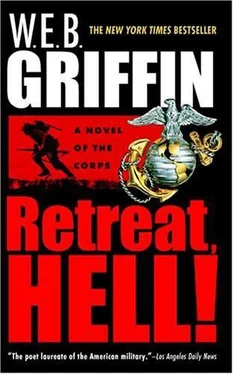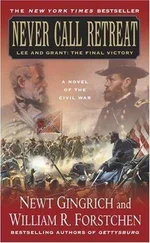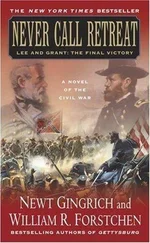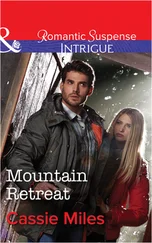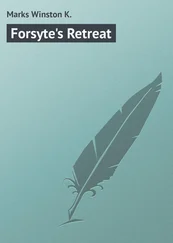A jeep was now coming down the line. Standing up in the front seat was Colonel T. Howard Kennedy, the X Corps Transportation Officer.
Captain MacNamara had three thoughts.
He's looking for me. I wonder what he wants?
Who does he think he is? Patton?
If I handle the sonofabitch right, he might be helpful in me getting to stay on active duty when the war is over, as it looks like it's going to be any day now.
MacNamara said, "Damn good job, First Sergeant. Tell the men."
"Yes, sir."
MacNamara then hurried around to the front of the latrine, and saluted crisply as Colonel Kennedy drove up.
"You weren't in your office, MacNamara," Colonel Kennedy said, more of an accusation than an observation.
"I was having a look at the new latrine, sir. Perhaps the colonel would like to have a look?"
Kennedy gave him a strange look.
"Perhaps some other time, MacNamara," Colonel Kennedy said.
"Yes, sir. I realize the colonel's a busy man."
"You have no idea how busy," Kennedy agreed, then turned to the business at hand. "MacNamara, I want you, right now, to start moving your vehicles up around Hamhung. You're too far south to do anybody any good here."
"Yes, sir. Where in Hamhung would you like me to set up, sir?"
"Anyplace you can do your job, Captain," Colonel Kennedy said, somewhat abruptly. "But start moving now. Not after supper, not tomorrow morning—now."
"Yes, sir," MacNamara said.
Colonel Kennedy looked at him for a moment, then said: "It's important that we get your vehicles north, MacNamara. X Corps is attacking north, and we'll be moving rapidly. If you have any trouble, let me know. Can you think of any problems right now?"
"Yes, sir."
"Well?"
"Drivers, sir," MacNamara replied.
"What about drivers?"
"Sir, I have right at six hundred vehicles to move. I have four officers and one hundred thirty-seven men—I have eight in hospital—and with just that many men, I'll have to make a lot of trips. Four, at least."
"You know, I didn't think about drivers," Colonel Kennedy confessed. "Let me get back to you, MacNamara. In the meantime, get off the dime."
"Yes, sir."
An hour later, Colonel Kennedy returned.
"We're going to kill two birds with one stone, MacNamara," he said, sounding pleased with himself. "Maybe more than two."
"Yes, sir?"
"The 7th Infantry Division Replacement Company has to be moved to Hamhung, too. Tents, equipment, and men. Instead of having them moved by a Transportation Truck Company, you're going to move them."
"Yes, sir."
"They have about three hundred replacements waiting assignment," he said. "I figure one in two of them should be able to drive a truck, and just about all of them should be able to drive a jeep."
"Yes, sir."
"That should give you all the drivers you need. Hie thee over to the Reple-Deple, MacNamara, they'll be expecting you."
"Yes, sir."
"Time is of the essence, MacNamara. Time is of the essence."
"Yes, sir."
Captain Roscoe T. Quigley, Adjutant General's Corps, who commanded the 7th Infantry Division Replacement Company, had quickly informed Captain MacNamara that he wasn't exactly happy with his orders from Colonel Kennedy, which he described as "verbal and vague in the extreme."
"I don't even know where I am to set up in Hamhung," he said, almost wistfully.
The moment he laid eyes on Captain Roscoe T. Quigley, AGC, a tall and slender officer with a pencil-line mustache, MacNamara had decided that Quigley (a) would much prefer to be in a heated office somewhere carefully checking Daily Morning Reports for prohibited strikeovers than where he was, trying to keep warm and dry in a leaking, dirt-floored tent, with the responsibility for feeding and housing three hundred-plus soldiers and (b) that Quigley, like most AGC officers in his experience, would be a real pain in the ass if he didn't quickly understand who was giving the orders.
"I think I know what we should do, Captain Quigley," MacNamara had said, firmly.
"What's that?"
"You and I will lead the advance party," MacNamara said. "A small convoy—say, no more than twenty six-by-sixes ..."
"That's a small convoy?"
"We have six hundred vehicles to move. Yes, Quigley, I'd say twenty against six hundred is a small convoy. Wouldn't you?"
"I had no idea there were that many vehicles."
"You and I—taking with us two of my officers and, say, forty of my men, and as many of your officers and men as you think you'll need—will go to Hamhung, reconnoiter the area, locate suitable areas for your replacement depot and my unit, and start setting up. Then you and I, having learned the route and the problems encountered on it, will bring enough non-coms back here, where they will set up convoys of the others. In the meantime, while you and I are up north, I will have my first sergeant run what I suppose you could call a driver's school for the drivers. You have any problems with that?"
"When had you ... uh ... planned to ... uh ... launch your convoy?"
"In an hour," MacNamara said.
"You mean today?"
"Colonel Kennedy told me, Quigley, that time is of the essence," MacNamara said. "You can do what you like, of course, but I'm going to start for Hamhung in an hour."
"Oh, I'll go with you, of course, Captain MacNamara," Captain Quigley said. "But I was wondering about an escort, I guess is what I mean."
"What do you mean by an escort?"
"I think we have to consider the possibility that we may encounter the enemy on the road."
"I doubt it," MacNamara said. "If there were enemy forces in the area, I'm sure Colonel Kennedy would have told me. Anyway, we're going to have, say, at least five men on each truck, times twenty trucks, which means we'll have at least a hundred men. That ought to be enough to defend ourselves."
"Well, I'll get right on it, of course, but it will take some time to issue ammunition to ... What did you say, one hundred men?"
"They have weapons but no ammunition?"
"You wouldn't believe the incidents that happen when the men in the replacement stream have access to live ammunition," Captain Quigley said. "It's like the O.K. Corral."
"Well, they better have live ammo now," MacNamara said. "A full combat load."
"You're right, of course," Quigley said.
"I'll be back in an hour," MacNamara said.
[TWO]
The Director's Office
East Building, The CIA Complex
243O E Street
Washington, D.C.
1615 31 October 195O
"May I come in, General?" Major General Roger J. Buchanan, USA, Ret'd., inquired of Walter Bedell Smith after he had been standing for two minutes—it seemed longer—in the open door, waiting for Smith to look up from what he was reading.
Smith lifted his eyes to the door and made a waving motion with his hand.
"Sure, Roger," Smith said. "What have you got?"
General Buchanan had worked for Smith through most of the time Smith had been General of the Army Dwight David Eisenhower's Chief of Staff at Supreme Headquarters, Allied Expeditionary Force in Europe, and had come to work for Smith shortly after Smith had been named Director of the Central Intelligence Agency.
"An urgent Eyes Only The Director from General Pickering," Buchanan said, walking to the desk and laying a manila folder on Smith's desk. Smith opened it. It was a thin sheaf of paper, each sheet bearing stamps reading TOP SECRET and EYES ONLY THE DIRECTOR at the top and bottom.
Smith picked up the sheet and started to read it, then looked at Buchanan.
"You haven't read this, right?" he asked.
"Of course not, General," Buchanan said. "It's classified Top Secret, Eyes Only The Director."
Читать дальше
